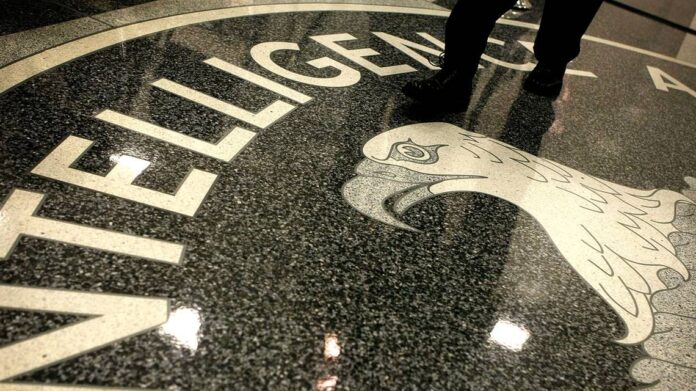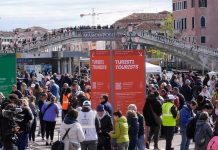Logo on the floor of the Central Intelligence Agency in the lobby of the Original Headquarters Building in McLean, Virginia.
Getty Images
WASHINGTON
Staying in a high-rise hotel on vacation this summer? Ask for a room below the top floors, but above the first. Familiarize yourself with the exits. And bring your own door stop.
The CIA is offering these tips and more to Americans ahead of Memorial Day weekend, borrowing from best practices of CIA officers located in global capitals, remote outposts, and active conflict zones, as the summer travel season picks up and coronavirus restrictions continue to ease.
“Call it travel tradecraft,” the agency said, publishing the new advice on its website. “Whether you’re off to a bustling city or a secluded getaway this summer, we hope these CIA ‘travel tips’ help you journey with more confidence and safety.”
Some of the guidance is standard practice for seasoned travelers. The spy agency recommends getting to the airport early, taking a photocopy of your passport and registering with the U.S. embassy when traveling abroad.
But some of their advice is more spook savvy.
“Don’t look like an easy target,” the guidance reads. “Take it from us, you don’t want to attract attention by looking meek, lost, or distracted.”
When arriving at a location, the agency recommends asking airport officials how much a taxi should cost to your hotel — not trusting the cab driver — and only using taxis from the airport’s official cue.
They recommend learning some basic words in the local language, such as “hello,” “goodbye,” and “police.”
And they suggest keeping the number of drinks you imbibe to a minimum.
“Spies might swill martinis in the movies, but alcohol impairs alertness and judgment,” the guidance reads. “You’ll want to be alert and maintain situational awareness, especially in an unfamiliar country.”
Once you have arrived at your destination, the CIA suggests familiarizing yourself with the emergency escape routes of your hotel and avoiding the staircases — where crimes are more likely to occur than elevators — except in case of emergencies.
And they say you should request a hotel room on the middle floor of a high-rise. “Being on the ground floor can leave you more vulnerable to break-ins, but many countries’ emergency response personnel aren’t equipped to reach higher than a few floors off the ground,” it reads. “Consider requesting a room somewhere in between.”
Use deadbolts to lock your hotel room, because “automatic locks on hotel room doors can often be forced open, and the chains can often be cut,” according to the guidance.
Don’t answer the door if unexpected room service, housekeeping or maintenance comes knocking.
And add a cheap and simple safety device to your packing list. “Do you know what else can help keep a door closed? A door stop,” it reads. “Consider investing in a traveler’s portable door lock or alarm to help further secure your hotel room.”
The new guidance is part of the intelligence agency’s Ask Molly series, an online forum for the CIA that answers questions from the public.
The agency also suggests mapping out detours in your travel excursions to avoid dangerous parts of town and poorly lit neighborhoods at night.
And above all, it suggests trusting your instincts.
“We know from experience that when something doesn’t feel right, it often isn’t,” the guidance reads. “Someone standing too close to you, following you across multiple locations, loitering outside your room — if a situation raises your suspicions, remove yourself from it or seek help.”
“The fastest way to get out of a crisis is to avoid trouble in the first place,” it adds. “If you hear a disturbance unfolding when you’re out and about, steer clear and leave the intelligence gathering to us. The commotion could be an escalating danger or a distraction designed to help someone pickpocket you. Your mission is to get home safe.”
This story was originally published May 27, 2022 8:01 AM.
Michael Wilner is McClatchy’s Senior National Security and White House Correspondent. A member of the White House team since 2019, he led coverage of the federal response to the coronavirus pandemic. Wilner previously served as Washington bureau chief for The Jerusalem Post. He holds degrees from Claremont McKenna College and Columbia University and is a native of New York City.














